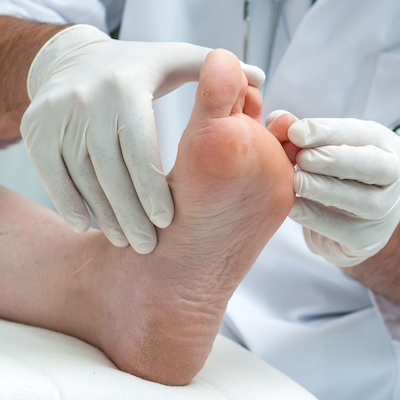What Is Athlete's Foot?
/Athlete's Foot is the common name for tinea pedis, a fungal infection of the feet. It's commonly found in athletes, who frequently wear damp socks and walk barefoot in public spaces, but anyone can get it, even you!
Spotting Athlete's Foot
Athlete's Foot has numerous symptoms. Inspect your feet often and be on the lookout for the following:
itching, stinging, or burning between the toes or on the soles
cracking or peeling skin, especially between the toes and on the soles
unusual dry skin
red, raw skin
tiny, itchy blisters
Preventing Athlete's Foot
Tinea pedis thrives in warm, moist environments. It is often found in showers, at the nail salon, on locker room floors, and around swimming pools. You can catch tinea pedis through direct contact with an infected person or by touching a contaminated surface. Minimize your risk of an athlete's foot infection by taking the following steps:
Wash your hands often. Use warm water and plenty of soap.
If you don't bathe or shower daily, take a few minutes to wash your feet and dry them well. Be sure to get the spaces between the toes.
Purchase a pair of inexpensive sandals and wear them when you find yourself in a hotel room or other public space where people commonly walk barefoot, such as locker rooms, showers, or swimming pools.
If your feet tend to get sweaty, apply antifungal powder daily.
Don't share socks, shoes, or towels with others, even family members.
Change your socks daily and vary your footwear to give your shoes time to dry out between use.
Treating Athlete's Foot
For most patients, athlete's foot is merely inconvenient, although it can be challenging to cure for some. If you have diabetes or a weakened immune system, athlete's foot can lead to more systemic infections and should be taken seriously. Regardless of your health status, if you are concerned that you've picked up a case of tinea pedis, you should visit us for diagnosis and treatment right away to make sure that the infection doesn't spread and that you don't give it to others. A simple exam can confirm your suspicion, although a lab test is occasionally necessary. Typically, routine application of antifungal cream or ointment is all that's needed to clear up your infection but oral medication may be called for, depending on the severity of your case.
Here at The Texas Foot Specialists, Dr. Bruce Miller and Dr. Gregory Mangum provide expert and specialized care to address all of your foot and ankle needs. From conservative to advanced surgical treatments, you can always count on us for quality and compassionate care. Contact us online to make an appointment at one of our conveniently located offices in Sugar Land, Pasadena or Houston.


